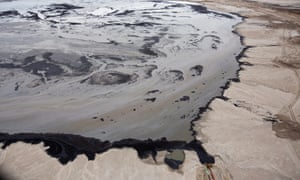Extract from The Guardian
Sharp rise globally in the dirtiest fossil fuel investments reverses
progress made after the Paris agreement, with tar sands holdings more
than doubling in Trump’s first year in office
Bank holdings in “extreme” fossil fuels skyrocketed globally to
$115bn during Donald Trump’s first year as US president, with holdings
in tar sands oil more than doubling, a new report has found.
A sharp flight from fossil fuels investments after the Paris agreement was reversed last year with a return to energy sources dubbed “extreme” because of their contribution to global emissions. This included an 11% hike in funding for carbon-heavy tar sands, as well as Arctic and ultra-deepwater oil and coal.
US and Canadian banks led a race back into the unconventional energy sector following Trump’s promise to withdraw from Paris, with JPMorgan Chase increasing its coal funding by a factor of 21, and quadrupling its tar sands assets.
Chase’s $5.6bn surge in tar sands holdings added to nearly $47bn of gains for the industry last year, according to the report by NGOs including BankTrack, the Sierra Club and Rainforest Action Network (RAN).
RAN spokeswoman, Alison Kirsch, accused banks such as JPMorgan Chase of “moving backwards in lockstep with their wrongheaded political leaders”.
“If we are to have any chance of halting catastrophic climate change, there must be an end of expansion and complete phase-out of these dangerous energy sources,” she said. “Banks need to be accountable and implement policies guarding against extreme fossil fuel funding.”
JPMorgan Chase has asked the US securities and exchanges commission for support in its bid to block a shareholder resolution calling for a bank report on financial and climate risks associated with tar sands projects.
Royal Bank of Canada and Toronto Dominion remain the biggest tar sands backers, with $38bn of holdings between them.
Kelly Martin, a campaign director at Sierra Club, said: “Tar sands and other fossil fuel projects threaten our climate, public health, and communities, and until they stop supporting them financially, major banks … are complicit in this destruction.”
The bulk of new “extreme” investments came in a doubling of loans and bonds to Canada’s government-backed tar sands industry, even though its success would be disastrous for climate mitigation efforts, according to the former Nasa chief James Hansen.
Bank funding for tar sands production and pipelines more than doubled last year – compared to the 2015-16 period, when then-US president Barack Obama nixed the Keystone pipeline project, which Trump subsequently reapproved.
Support for coal among the 36 banks surveyed was also up by 6% in 2017 after a 38% plunge in 2016. Large Chinese banks actually reduced these investments last year and in Europe, BNP Paribas and ING moved to limit their exposure to fossil fuel assets.
However, 14 European banks collectively increased their coal financing by more than $2bn last year, with HSBC the worst performer by far.
“Europe’s top banks have got to stop their coal-focused assault on the Paris agreement,” said Johan Frijns, the director of BankTrack. “It is now vital that they move to stamp out their financial support for companies developing new coal-fired power plants around the world.”
A sharp flight from fossil fuels investments after the Paris agreement was reversed last year with a return to energy sources dubbed “extreme” because of their contribution to global emissions. This included an 11% hike in funding for carbon-heavy tar sands, as well as Arctic and ultra-deepwater oil and coal.
US and Canadian banks led a race back into the unconventional energy sector following Trump’s promise to withdraw from Paris, with JPMorgan Chase increasing its coal funding by a factor of 21, and quadrupling its tar sands assets.
Chase’s $5.6bn surge in tar sands holdings added to nearly $47bn of gains for the industry last year, according to the report by NGOs including BankTrack, the Sierra Club and Rainforest Action Network (RAN).
RAN spokeswoman, Alison Kirsch, accused banks such as JPMorgan Chase of “moving backwards in lockstep with their wrongheaded political leaders”.
“If we are to have any chance of halting catastrophic climate change, there must be an end of expansion and complete phase-out of these dangerous energy sources,” she said. “Banks need to be accountable and implement policies guarding against extreme fossil fuel funding.”
JPMorgan Chase has asked the US securities and exchanges commission for support in its bid to block a shareholder resolution calling for a bank report on financial and climate risks associated with tar sands projects.
Royal Bank of Canada and Toronto Dominion remain the biggest tar sands backers, with $38bn of holdings between them.
Kelly Martin, a campaign director at Sierra Club, said: “Tar sands and other fossil fuel projects threaten our climate, public health, and communities, and until they stop supporting them financially, major banks … are complicit in this destruction.”
The bulk of new “extreme” investments came in a doubling of loans and bonds to Canada’s government-backed tar sands industry, even though its success would be disastrous for climate mitigation efforts, according to the former Nasa chief James Hansen.
Bank funding for tar sands production and pipelines more than doubled last year – compared to the 2015-16 period, when then-US president Barack Obama nixed the Keystone pipeline project, which Trump subsequently reapproved.
Support for coal among the 36 banks surveyed was also up by 6% in 2017 after a 38% plunge in 2016. Large Chinese banks actually reduced these investments last year and in Europe, BNP Paribas and ING moved to limit their exposure to fossil fuel assets.
However, 14 European banks collectively increased their coal financing by more than $2bn last year, with HSBC the worst performer by far.
“Europe’s top banks have got to stop their coal-focused assault on the Paris agreement,” said Johan Frijns, the director of BankTrack. “It is now vital that they move to stamp out their financial support for companies developing new coal-fired power plants around the world.”

No comments:
Post a Comment